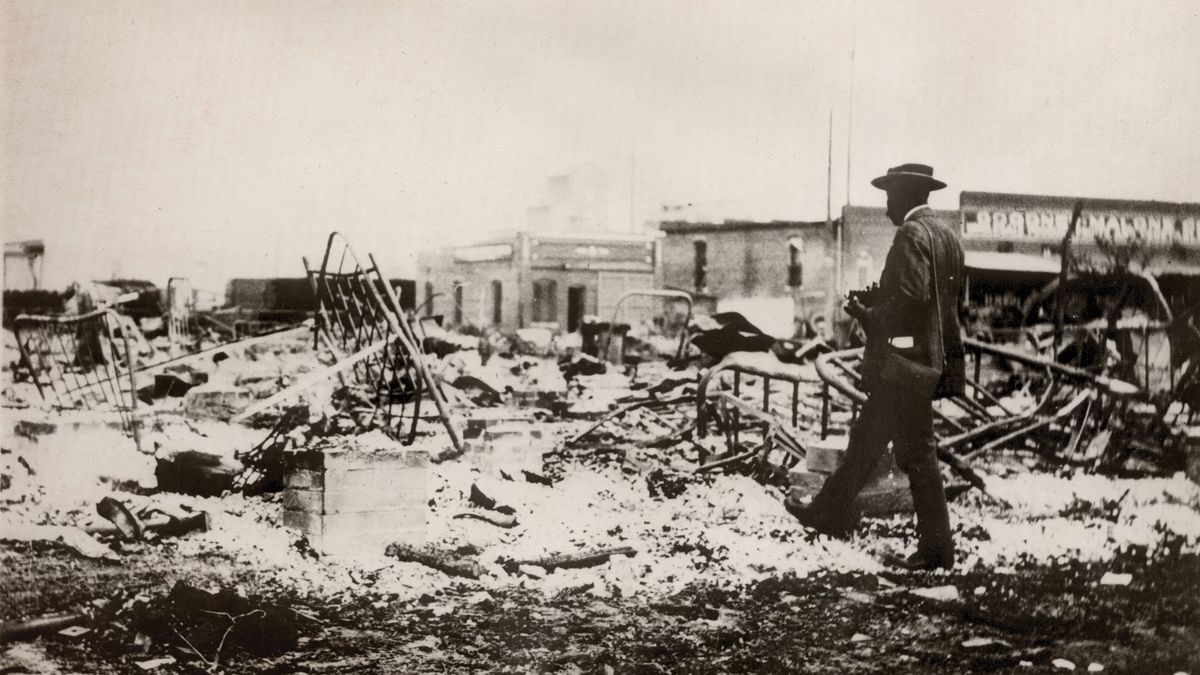Apple Podcasts / Google Podcasts / Spotify
—
The Story is brought to you exclusively by Salesforce, a company that is committed to building a path toward Equality For All.
—
Three men surrounded the lone woman.
She and her husband owned the hotel, but it was a large building. Her husband was nowhere to be found.
In front of her, the men began circling as she trembled in fear…
Thirty-three years before, the young woman and her husband listened to the rumors.
It was 1889, only 24 years after the Civil War, and racial tensions were at an all-time high. There were whispers, though, that in Tulsa, Oklahoma, race didn’t matter as much. People were too busy making money to care. Oil was discovered, sending ripples of economic prosperity and hope all throughout the south. Soon, Oklahoma would be open for settlers to stake claims to new, fertile land. Oklahoma, along with Kansas and Colorado, was nicknamed the, “Promised Land”. The groups of former slaves that were moving there called themselves the Exodusters.
The man and his wife, Emma, had been among the first people to hear about the promised land. They sold everything they had and moved—eager to claim their stake.
In the frontier outside of Tulsa, the man bought 40 acres and began subdividing and selling it. Soon after that, he ran for county treasurer but lost. Instead, the man took a job as a teacher and principal of a local school. He and his wife managed to scrape together enough money to start a general store. At that point, the town consisted of a dirt main street lined by shacks, tents, and a hodgepodge of businesses.
The economic boom helped ease racial tensions, but the schoolteacher knew what happened when growth stopped. Booms lead to busts, after all. Those who were used to making easy money had a tendency to become monstrous when things turned sideways.
He was an avid reader, and soon met another man who shared his appetite for books. That man was John “The Baptist” Stradford – JB for short. JB and the schoolteacher became fast friends.
But they worried about the future.
They knew the boom wouldn’t last forever, so the schoolteacher worked around the clock to capitalize on the good times.
He and Emma kept saving until they had enough money to buy a hotel. Next, he started a Masonic Lodge. Then the couple launched an employment agency. When election campaign season started, the two led voter training and registration efforts.
The schoolteacher’s leadership and drive did not go unnoticed.
The town elected him as sheriff’s deputy.
Word began to circulate that he was wealthy. One day, a local newspaper even published a story estimating his net worth to be $3.6 million dollars.
The schoolteacher cringed when he read it. He might be worth a few million, but he barely had any liquid assets. Just making payroll was a challenge. He laughed at the thought of others thinking he was “rich” or that he had “made it”. His net worth wasn’t promised, and he never became complacent.
He and Emma invested every extra dollar they made into their businesses.
They tended to their promised land and it grew.
The schoolteacher, Emma, and JB began to build the town’s culture.
They brought in celebrities, thought leaders, and pastors like Martin Luther King Sr.
Booker T Washington was in awe of what they built, and dubbed it, “Black Wall Street”.
Soon, the promised land was thriving. The people there were entrepreneurial, and they all supported each other’s businesses. Nothing can stop the growth of a network of businesses where the velocity of money is fast. The schoolteacher and JB knew this and presided over the economic boom. They grew the promised land from a few hundred people to more than 8,000 by 1921.
At this point, the schoolteacher’s net worth had grown to nearly ten million dollars. But the wealth drew unwanted attention.
The townspeople supported the schoolteacher, however, some of them felt he was too soft. JB, on the other hand, was famous for his temper. Once, when walking in the street, a delivery man on a horse hurled a racial epithet at him. When the man repeated the slur, JB pulled him off his horse and proceeded to beat the man until other townspeople stepped in to pull him off.
Unlike JB, the schoolteacher had yet to be tested. One night, all of that changed.
He was sitting at the bar of the hotel, sipping a whiskey, when he looked upstairs. The door that led to his and his wife’s apartment was shut. Something wasn’t right.
He bounded up the stairs and ran down the hall to their apartment.
At the far end was his wife, surrounded by three white men. She was shaking, and he curtly informed the three men to get out. They didn’t respond and his wife yelled for help.
The normally mild-mannered schoolteacher rushed the three men. He dove into the first man, and after a flurry of punches, the second man was on him. He lashed out with punches and well-placed kicks. The men were no match for the schoolteacher.
Soon he stood over the bleeding face of the third man. He was seething with anger and his wife assured him she was okay.
The three men sprinted for the steps. The first two made it down but he caught the third man’s foot, sending him sprawling down the stairs. At the bottom, in the lobby of his hotel, he challenged the three men to continue their fight. They turned and fled, but everything was about to change for the schoolteacher.
The next day, the local newspaper ran the report of the schoolteacher’s fight. He was a hero among the African American community, but among the whites, he was now a target.
Soon after, the 1921 race riots began.
Small squabbles turned large, and many white Americans were envious of what the schoolteacher had built in this promised land. Fights broke out, and soon mobs of white people were looking to lynch black prisoners. The idea of the promised land was fading fast.
One morning the schoolteacher and his wife woke up to smoke in the air. Gunshots followed, and as the schoolteacher walked outside, he looked with horror at their town.
Mobs of armed white people filled the streets, and six men approached him, carrying rifles and gasoline.
“That hotel is gonna burn,” they said. “Get everyone out before it’s too late.”
Moments later he and his wife had alerted the guests. They grabbed what belongings they could and fled.
Smoke filled the skies. Everything they had built was destroyed. The promised land and the city they founded was in ruins. Tears filled their eyes. They tried to hide in the smoldering remains of their town, but groups of angry and armed lynch mobs roamed the streets. Rumors had spread that their good friend JB Stradford had been charged with inciting a riot. The penalty was life in prison or death. Overhead, airplanes patrolled the skies, dropping firebombs and looking for anyone who tried to escape.
That was the last that anyone ever heard of the schoolteacher and his wife Emma.
The dream of the promised land that the Exodusters hoped for had been realized – their vision had been achieved… and then it was destroyed.
Throughout Oklahoma, word spread that the promised land was gone and so were the schoolteacher and his wife who founded it. The promised land of Greenwood, Oklahoma was no more.
Months later, JB Stradford turned up alive in Chicago. Although he lost all of his money, he reunited with his family and started over. When they told him that the schoolteacher and his wife had been killed, he laughed. He pulled out a series of letters from his bag and laid them on the table…
Across the country, in Los Angeles, the schoolteacher and his wife toasted to their safety as they looked out over the ocean and the setting sun.
They had managed to escape the clutches of the monsters. They had traveled by night until they reached California.
You might know the schoolteacher by another name, Ottowa (O.W.) Gurley.
O.W. Gurley was the visionary pioneer that built Greenwood from nothing into an economic powerhouse. He understood how important the velocity of money was, and created a town where entrepreneurship and education were worshipped.
He built the “Promised Land” on the plains of the Oklahoma territory.
The mob destroyed it. But there are certain things mobs will never be able to destroy.
O.W. Gurley’s vision for the promised land lives on in the hearts and minds of Americans across the country. He showed that if we can put aside our differences, true economic and personal prosperity is sure to follow.
That’s his story. What’s yours going to be?



